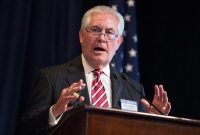Support strong Canadian climate journalism for 2025
It's now been revealed that the FBI had two political bombshells ready to drop during the last U.S. election. One, it unloaded on Democrats two weeks before election day. The other it held onto — until two months into Donald Trump's presidency.
It dropped Monday.
In an announcement that could forever affect history's account of the 2016 election, the FBI announced that it has been investigating possible criminal collusion between the Russian government and associates of the Trump campaign since July.
FBI director James Comey revealed it while testifying to Congress. He's the same FBI director who three times during the campaign commented publicly about an investigation into Hillary Clinton's emails.
The news came in a five-hour hearing that concluded with the Republican committee chair stating the politically obvious: this shadow will linger for a while, creeping over the Trump White House.
"The longer this hangs out here, the bigger the cloud is," Republican Devin Nunes said as the hearing ended.
"There's a big, grey cloud that you have now put over people who have very important work to do to lead this country. So the faster you can get to the bottom of this, it's gonna be better for all Americans."
Comey replied: "I understand."
His revelation fanned a low-level fire crackling for months in the U.S. capital over why the Putin government intervened in the U.S. election; what its motives might have been; and whether the Trump team knew about it.
Late last July, Comey said, the agency began investigating contacts between Trump associates and the Russian government — which is believed to have stolen emails from the Democratic party and leaked them through intermediaries Wikileaks and Guccifer.
The investigation will include whether crimes were committed. It's unclear how long the probe will take. And law-enforcement officials wouldn't say a word about which Trump associates were targeted in the probe.
Comey declined to say whether his agency had questioned Michael Flynn, Trump's just-fired national-security adviser; Paul Manafort, his fired campaign manager; or Roger Stone, his longtime friend who admits he had back-channel communications with Wikileaks.
The White House moved to cut ties to all of them.
Trump spokesman Sean Spicer played down the importance of Flynn, calling him "a volunteer of the campaign." Manafort, he said, played "a very limited role for a very limited amount of time."
The so-called volunteer was Trump's No. 1 foreign-policy and national-security adviser. The man with the supposedly limited role? His campaign manager, who oversaw the party's national convention.
Another thing the men shared in common, beyond their senior roles: Flynn and Manafort both drew business revenues from entities close to the Putin government, and both were forced to quit over news stories about unreported contact with Russians.
It was those news reports that some Republicans seemed most fixated on.
Republican Trey Gowdy pointed out that leaking intelligence material is punishable by up to 10 years in prison. He asked whether journalists could also go to jail for reporting on leaks — like the intelligence chatter showing Flynn called the Russian ambassador in December, and didn't disclose it.
Comey wouldn't bite: "I don't think a reporter's been prosecuted (for that) in my lifetime."
Comey resisted being pressed on what Russia would have gained from making Trump president. He did say that Russian President Vladimir Putin harboured a personal hatred of Democratic nominee Hillary Clinton, stemming from her perceived encouragement of anti-Putin agitators.
He said the Russians went through various phases. He said intelligence sources concluded that the primary aim was to hurt the likely next president, Clinton — but for one brief moment late last spring, the Russians thought Trump had a chance.
"The hatred for Mrs. Clinton was all the way along. When Mr. Trump became the nominee, there was some sense that, 'It'd be great if he could win, great if we could help him, but we need to hurt her, no matter what,'" Comey said.
"And then it shifted to, 'He has no chance, so let's just focus on undermining her.' That was the judgment of the intelligence community."
One thing Comey and another colleague did while testifying Monday was blow up a White House talking point: that former president Barack Obama spied on Trump, possibly using British intelligence agencies as an intermediary.
National Security Agency Director Mike Rogers heaped scorn on the idea. With gritted teeth, he said that would violate the agreement between the so-called "Five Eyes" intelligence agencies — the U.S., U.K., Canada, Australia and New Zealand — not to spy on each other's citizens.
"I think (Trump's claim) clearly frustrates a key ally of ours," Rogers said.
As for what's next, longtime Trump friend Stone said he looked forward to testifying to defend his name. Democrats were eager to press the issue — while fuming that the news came 133 days too late.
Clinton's campaign spokesman Brian Fallon tweeted: "Fair to ask why (Comey) didn't think voters deserved to know (before Nov. 8)."





Comments
How is it that Comey wasn't removed from his job and investigated for election tampering himself?